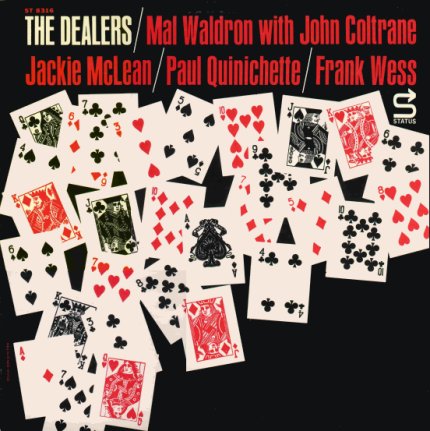
And I've talked more than once about the brilliance of Mal Waldron as a composer, and as an interpreter of his own compositions. Very often, when a group is playing a Waldron tune, he'll take a late solo, or the last solo, and he'll add something that the other brilliant musicians on the take have missed -- something that goes to the heart of the song.
So what to talk about here? Well, one thing that you very rarely find on a Bob Weinstock recording, the existence of alternate takes. Weinstock, as we know, valued spontaneity and didn't encourage a lot of second and third tries on a tune. Also, as we know, he valued recording tape and didn't like to waste it, so most unused takes were taped over.
Alternate takes are often a treasure to the jazz scholar, just as often a pain in the neck to the jazz lover who just wants to hear music, not study it, and whose enjoyment of the CD version of an album he once loved is marred by having to listen to five different takes of some group's version of "Ornithology." But because they are so infrequent on Prestige, and because I am sort of pretending to be a jazz scholar in this project, they're a rare treat.
I listened to the final take of "Wheelin'" first, the alternate take second, wondering if I'd hear the difference, or get why they were dissatisfied with the first. And maybe I did. This is a very swinging group, with two Lester Young acolyte Basie-ites, and a piano player who would be tapped by Pres's soulmate Billie Holiday as her accompanist, and as great as the first version is, maybe they thought that they could swing harder.
Especially Mal Waldron. On the final take, I was blown away by his piano solo, hard as nails, played almost entirely on the topmost end of the piano. The earlier version is mellower, and it seems as though Waldron decided to trade sonority for percussiveness, not unlike what Illinois Jacquet did in his classic recording of "Flying Home" with the Lionel Hampton band, when he created the honking tenor sound, with all its emotional immediacy. Waldron is doing something a lot more complex, but no less immediate.
Other thoughts about this session: I was drawn in by the inescapable beat of the rhythm section on Mercer Ellington's "Things Ain't What They Used to Be," one of the numbers that features Wess on flute. And speaking of Illinois Jacquet, his "Robbins Nest" is one of the great jazz standards, with an irresistible melody and ample room for improvisation, done proud by this ensemble. Jacquet's collaborators on "Robbins Nest" were Sir Charles Thompson and Bob Russell, a fine lyricist (Songwriters Hall of Fame) who seemed to have a penchant for writing lyrics that were rarely used, although there is a version of "Robbins Nest" by Ella Fitzgerald.
 All of the final takes m this session were on the Prestige album Wheelin' and Dealin', credited to the All Stars. The two alternate takes made it to a budget Status album, The Dealers, credited to Waldron and also featuring two cuts from his April 19 session. The alternate takes inevitably made their way onto the CD reissue of Wheelin' and Dealin'. Weinstock must have been moved as I was by the irresistible beat of "Things Ain't What They Used to Be," because it was released as a two-sided 45, under Coltrane's name.
All of the final takes m this session were on the Prestige album Wheelin' and Dealin', credited to the All Stars. The two alternate takes made it to a budget Status album, The Dealers, credited to Waldron and also featuring two cuts from his April 19 session. The alternate takes inevitably made their way onto the CD reissue of Wheelin' and Dealin'. Weinstock must have been moved as I was by the irresistible beat of "Things Ain't What They Used to Be," because it was released as a two-sided 45, under Coltrane's name.

No comments:
Post a Comment